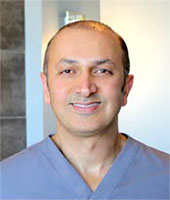Bruxism: The Seemingly Harmless Habit That Could Literally Make Your Teeth Fall Out!
 Do you sometimes find yourself waking up some mornings with a headache you can’t seem to explain? Have you experienced slight muscle pains in your face? If you answered “Yes” to these questions, you may be suffering from bruxism. Bruxism is more commonly referred to as “teeth grinding” or “jaw clenching”. This nasty habit seems harmless, but should not be ignored. The truth is, bruxism wears your teeth down and sets you up for cavities and makes you vulnerable to tooth fractures. If not addressed, worst case scenario is that bruxism will contribute to tooth loss. Below are ways to better understand bruxism and how you can address the issue to save your smile.
Do you sometimes find yourself waking up some mornings with a headache you can’t seem to explain? Have you experienced slight muscle pains in your face? If you answered “Yes” to these questions, you may be suffering from bruxism. Bruxism is more commonly referred to as “teeth grinding” or “jaw clenching”. This nasty habit seems harmless, but should not be ignored. The truth is, bruxism wears your teeth down and sets you up for cavities and makes you vulnerable to tooth fractures. If not addressed, worst case scenario is that bruxism will contribute to tooth loss. Below are ways to better understand bruxism and how you can address the issue to save your smile.
What Causes Bruxism?
Here at Smile in LA, we’ve understand that many factors can combine to create a bruxism habit. It is believed that anxiety and stress are the leading causes of bruxism. A misaligned bite, having missing teeth, or sleep abnormalities can also contribute to bruxism. There have also been some medications known to trigger episodes. Even neurological or musculature illnesses have been linked to the development of bruxism. If you’re are currently experiencing facial pain or discomfort due to bruxism, give us a call at (323) 461-9353 and schedule an immediate appointment.
Isn’t it Common for People to Grind Their Teeth?
Teeth grinding may be a common issue amongst the population, but that does not mean this action is necessarily “normal”. Due to the fact that the stresses of bruxism affect your entire jaw, this pressure has been known to create cracks and chips in teeth. Over time, this can lead to jawbone loss which will result in a shortening of lower face height. For this reason, signs of bruxism should not be ignored! Los Angeles Dentist Dr. Shervin Louie of Smile in LA is pretty sure that is not a look you’re are looking to capture!
How Do I Know I Have a Bruxism Problem?
In a majority of cases, we are able to see evidence of bruxism in your X-rays, an also from examining for signs of bruxism on the surface of your teeth. We will alert you about any bruxism issues we see long before you exhibit a single symptom, especially if you sleep alone (which makes bruxism harder to notice). However, you might notice that you may occasionally begin to clench and grind your teeth between visits and start to notice bruxism symptoms on your own. If this explains your current situation, and you find that you frequently awake with a sore jaw, a headache that goes away shortly after rising, or if a loved one tells you your teeth are making odd “clicking and clanking” noises all night, be sure to mention it the next time you’re visiting our Los Angeles dental practice.
What Treatments Are Available?
Due to the varied cases of bruxism, treatments options vary as well. For example, should we determine stress as the primary cause of your bruxism, we will recommend you abstain from excessive caffeine as well as alcohol, while including some form of daily relaxation. Even something as simple as taking time to soak in a warm bath before sleeping can work ease your body and mind working to stop your bruxism habit.
Now, if your bruxism is a bit more serious, and your bite is of concern or if Dr. Louie suspects your bruxism links to a TMJ disorder, he will use his expertise to assist you with the root cause. In either case, we still like to start out with recommending an occlusal mouth guard to protect your teeth and jawbone from further damage. Protective devices like a sleeping mouth guard are easy to wear, and best of all – will not disrupt your ability to get a peaceful night’s sleep. As a matter of fact, sleeping guards tend to improve your quality of your sleep resulting in you waking up more refreshed and feeling well rested. Patients using sleeping guards have reported to snore less or stopped snoring, as well as awake with less facial pain.
So, the next time you’re sitting in for your dental visit at Smile In LA, ask if some sort of sleeping guard may help with your bruxism. It is common for many people go years without ever being aware of the fact that they are clenching and grinding their teeth since it takes some time for symptoms to show and be recognized. Getting a mouthguard once you are aware you have this habit will help you find relief from related headaches and muscle pain. Call us at (323) 461-9353 or visit our website for more information on how we can help you.
